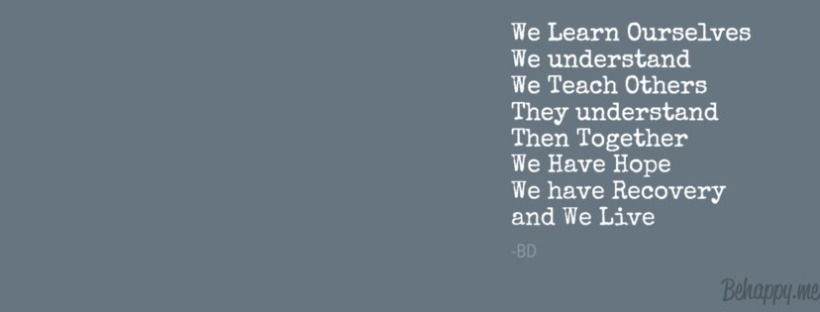Words have an immense power they can easily make or break a person. A word is very powerful and we often underestimate its power.
Of late I have been reading a lot of blogs describing people with disability as “differently able” which angers me a lot because I want to be referred to as person first not different because I have a disability. This is my opinion and opinions are not facts that can’t be proved wrong.
While addressing people with disabilities, knowingly or unknowingly, many of us use undignified and incorrect terminologies. These words will play a negative impact on both the personal and professional development of people with disabilities. This got me thinking there must be data for correct and dignified terminology, here are some I found;
|
*THIS IS NO WAY AN EXSUSTIVE LIST please see
http://www.cpdusu.org/about/committee/awareness/
http://www.nfdn.org.np/advocacy-documents/dignified-terminologies-pwds.html
http://www.courts.ca.gov/partners/documents/7-terminology.pdf
http://nda.ie/Publications/Attitudes/Appropriate-Terms-to-Use-about-Disability/
http://www.onestops.info/article.php?article_id=14
http://www.miusa.org/sites/default/files/documents/resource/Respectful%20Disability%20Language.pdf
Things to remember
- Individuals with disabilities are people!
- Individuals with disabilities are whole people!
- They expect to be treated with the same dignity and respect that you do.
- Just because someone has a disability does not mean he/she is disabled.
Disability vs. Handicap
A disability is a condition caused by such things as an accident or trauma, disease, or genetics that limits a person’s vision, hearing, speech, mobility, or mental function.
A handicap is a constraint imposed upon a person, regardless of that person’s ability or disability. These constraints can be physical or attitudinal. For example, stairs and curbs are handicaps imposed on those who use wheelchairs.
Always remember that the person is not the condition. Keep all your speech person focused, not disability focused.
We live we learn but most importantly we learn for life is always changing always evolving.

Good info!! Thanks
LikeLiked by 1 person
My pleasure
LikeLiked by 1 person
That was something which had to be said. It’s beautiful how you brought to light something so important that many of us consider of trifle importance. It was a much needed post. Keep writing 🙂
LikeLiked by 1 person
Thank you so much💗
LikeLike
Excellent points. Language is powerful and it makes sense to take care. 🙂
LikeLiked by 2 people
☺
LikeLiked by 1 person
A nice post miss. I’ll be taking care of using the above mentioned words the next time I address a person with disability.
LikeLiked by 1 person
Best and when in confusion ask them what would they like to be adressed as and it’s always by their name.💗
LikeLiked by 2 people
Prakhar I can’t view your blog, have u moved it ?whats the add now?
LikeLike
I don’t know why this is happening.
Try through this link – http://www.prakharbansalblog.wordpress.com
If it does not open in WordPress, try the same link through browser.
LikeLike
Thanks
LikeLike
Most welcome 🙂
LikeLike
Hi I am a cabincrew. In our guidelines its mentioned differently abled and we r strictly asked to use the same term instead of disabled in front of our passengers. Your post is an eye opener. Thank you.
LikeLiked by 2 people
I am smiling😜
LikeLiked by 1 person
Do smile always😊
LikeLiked by 1 person
Wonderful info to help us be more compassionate, thank you, Srijana.
LikeLiked by 1 person
☺
LikeLike
It is stange that words can hurt so much, although non-verbal communication or body language are said to be more important than spoken words.
LikeLiked by 1 person
Maybe language is dearer to our heart cause it’s our invention
LikeLiked by 1 person
Maybe.
LikeLiked by 1 person
Very well said!!! 😊
LikeLiked by 1 person
Thank You
LikeLiked by 1 person
Words do matter. I’d mostly agree with the table but personally I am happy to call myself a disabled person. Also there is the social model of disability, supported by many disabled people in the UK, which highlights how the lack of adaptation in society is the main cause of disability, and so under that model ‘disabled person’ means ‘person disabled by society’s lack of adaptation’. Worth checking out: https://www.scope.org.uk/about-us/our-brand/social-model-of-disability
You’re absolutely right that ‘person’ makes a difference to the terms… no one wants to be seen just as a condition. x
LikeLike
You are right on the meaning of a disabled person in the UK or the developed countries of the world the struggle for inclusion is or might be at level 7 out of 10 from the perspective of developing countries ,here we are just starting😞and thank you so much for the link will read it thoroughly
LikeLike